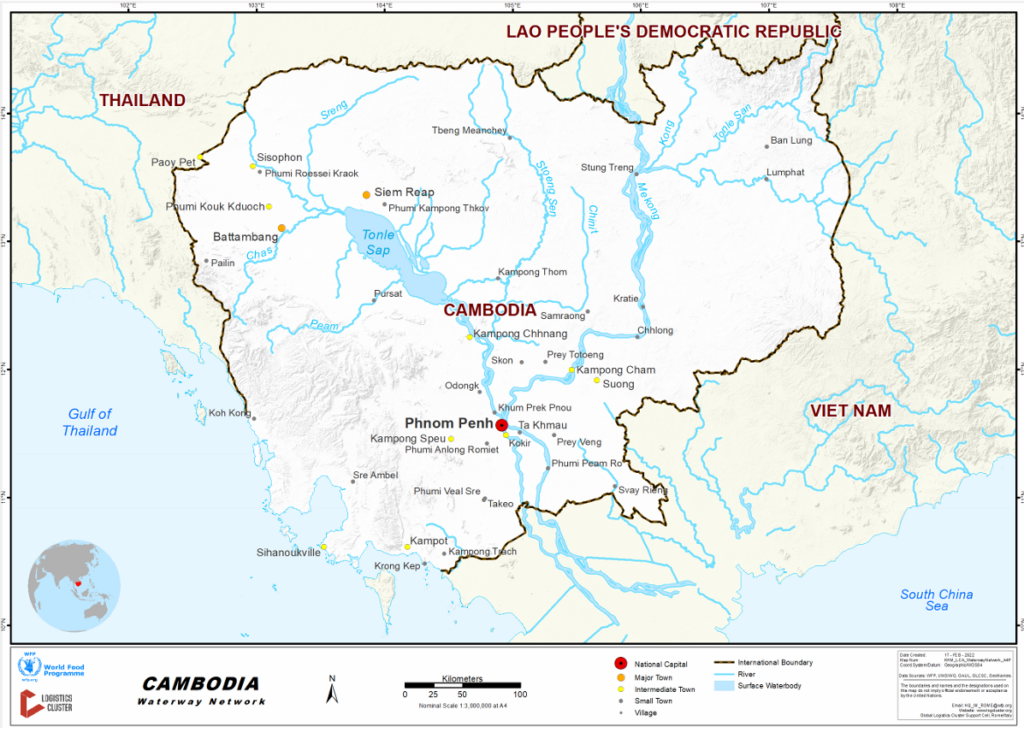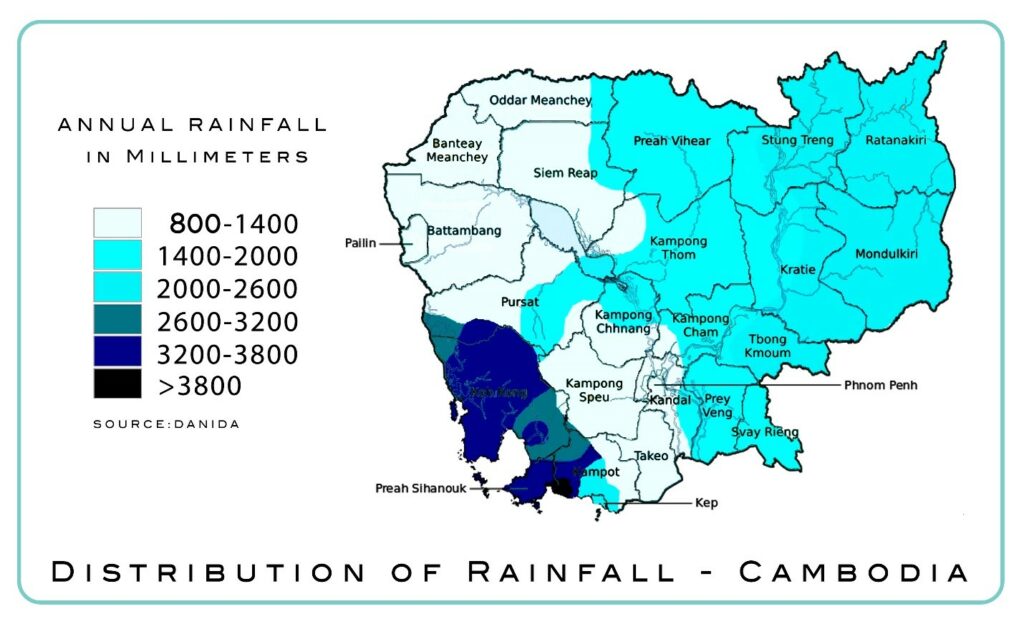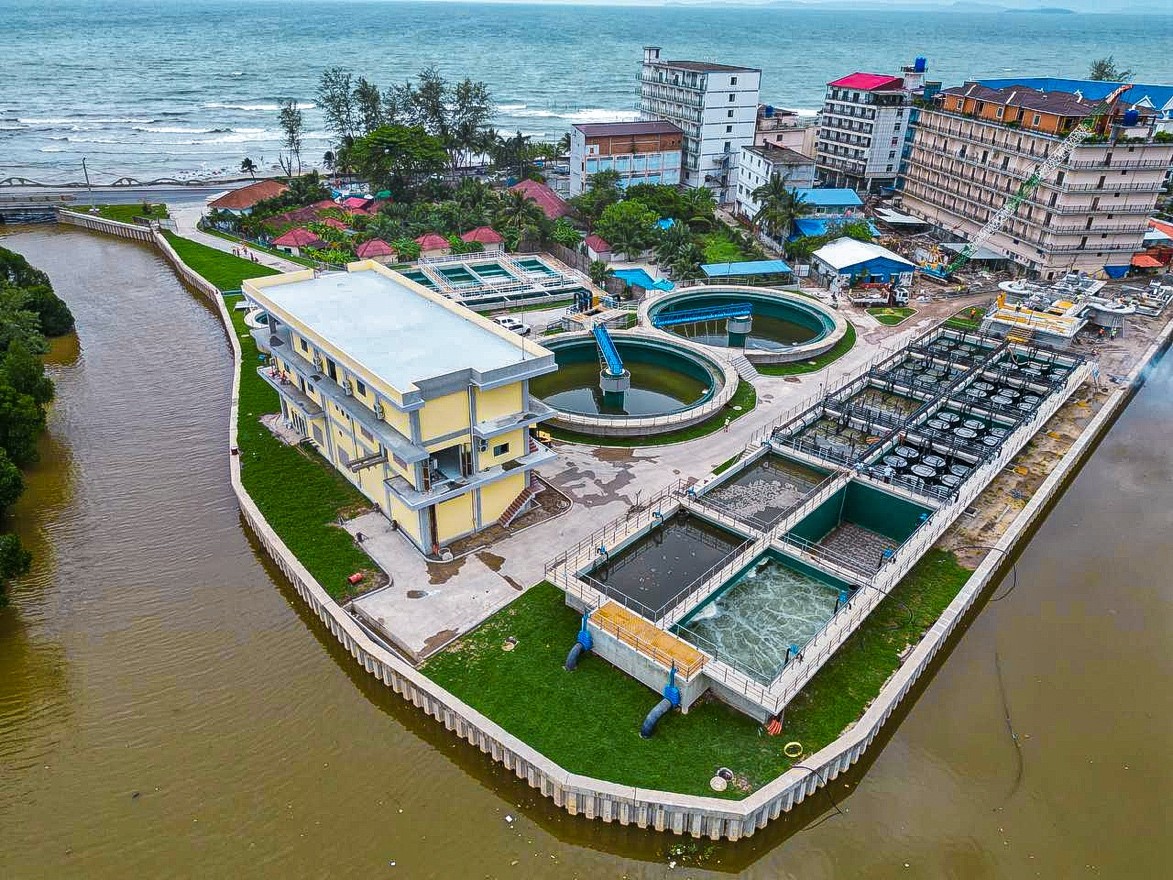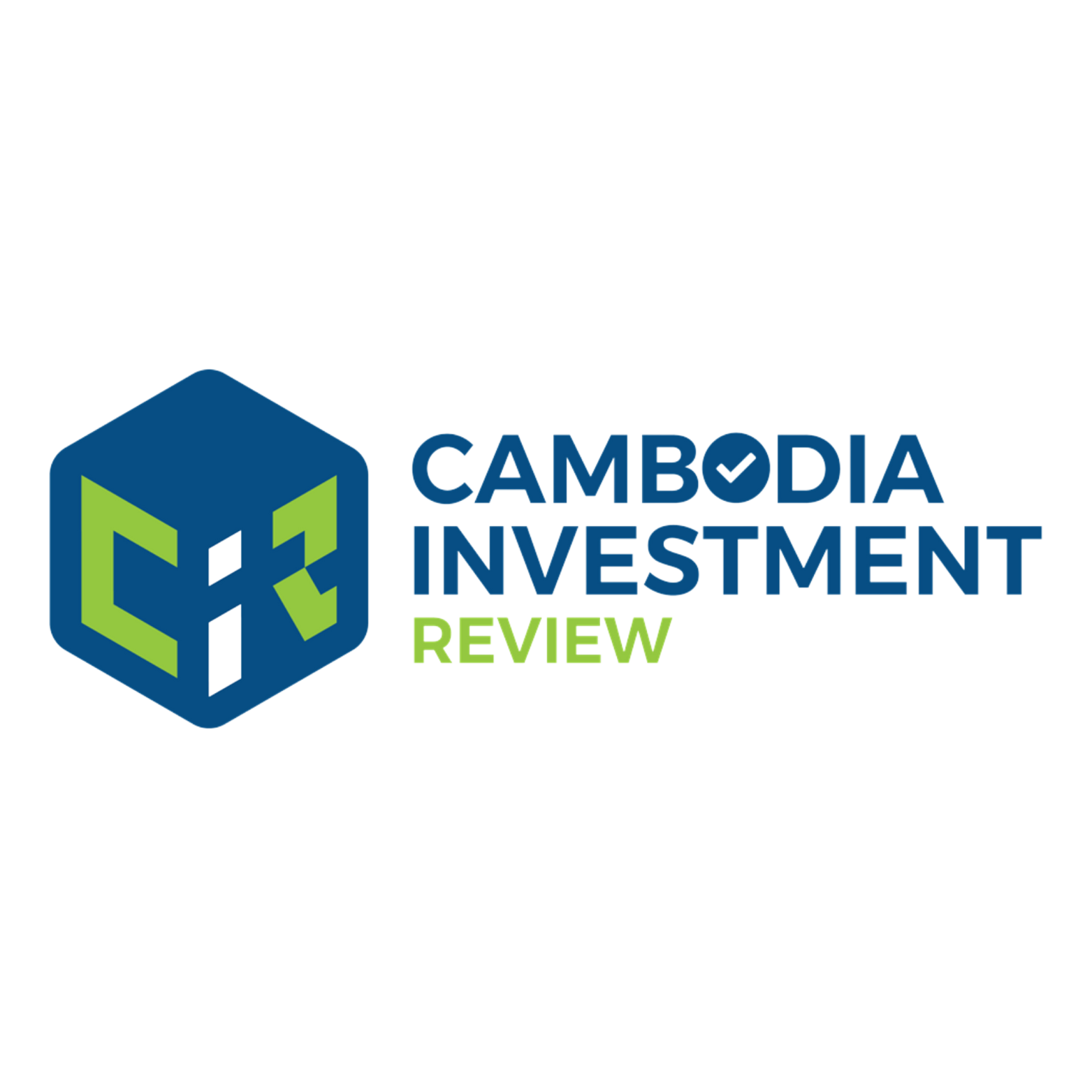This article provides an overview of wastewater management in Cambodia, covering the current challenges, government initiatives, international collaborations, and ongoing developments. Additionally, it highlights business opportunities for both foreign and local investors. For further detailed market insights, please refer to our comprehensive cross-sector business environment map here or get in touch with our expert team.
Cambodia’s economy relies heavily on its rich groundwater and surface water resources, which mostly come from the Mekong and Tonle Sap rivers. Cambodia’s annual precipitation commonly ranges from 1,400 mm to 3,800 mm, although climate change as well as industrialization are complicating water management; in the dry season, there are more water shortages, and in the rainy season, more floods.
Cambodia has experienced rapid urbanization and industrialization in recent years, which, naturally, has led to more wastewater coming from residential, commercial, and industrial sources. Phnom Penh, in particular, struggles with rainy season flooding, which has a lot to do with its outdated sewage and drainage systems. Some parts are nonfunctional and some are too weak, for example, to handle the demands that are created by a growing population and more industrialization that’s been happening in the city.

Beyond sheer volumes, there is another major problem. Most discharged water isn’t undergoing proper treatment before entering main water bodies. (In fact, only a handful of cities – Phnom Penh, Siem Reap, Sihanoukville, and Battambang – have wastewater treatment facilities). This poses risks to human health and the environment. Coping with this challenge is significant for wastewater managers in Cambodia.

Recent developments signal a shift towards improved wastewater management in Cambodia. More specifically, the Royal Government of Cambodia (RGC) is addressing its progressive development agenda, since water resources are vital drivers of the Kingdom’s modern economic expansion in agriculture, industry, hydropower, navigation, and tourism.
What are the government’s efforts to address the wastewater issues in Cambodia?
RGC has recognized the importance of wastewater management, and, as such, is also showing commitment to addressing it as part of broader efforts to improve: public health; environmental sustainability; and socio-economics.
Here are several of their key initiatives:
- Policy and Regulation: Government work continues on strengthening policies and regulatory frameworks that guide wastewater management efforts and pollution control, including: setting standards for effluent discharge; establishing monitoring systems; and enforcing compliance to ensure that industries and municipalities can safely and effectively treat their wastewater before getting rid of it. Notable wastewater management-related policies, regulations, and plans include:
- The Law on Environmental Protection and Natural Resource Management (Enacted in 1996 and revised in 2007)
- The National Policy on Sanitation and Clean Water Supply (Launched in 2000 and revised in 2010)
- Sub-Decree on Wastewater Management (Issued by the Ministry of Environment)
- National Strategic Development Plan
- National Strategy for Rural Water Supply, Sanitation and Hygiene 2014-2025
- Master Plan on Drainage and Sewerage Improvement 2035
- Phnom Penh Green City Strategic Plan 2017-2026, etc.
- Investment in Infrastructure: The government has invested in the construction of wastewater treatment plants and sewerage systems in urban areas. Projects such as the Phnom Penh Wastewater Management Project aim to expand the area of sewerage coverage. Further, plans call for the construction of treatment plants so as to mitigate pollution and improve treatment capacity.
- Capacity Building: The government has been working to strengthen institutional capacity for wastewater management. This includes training programs for government officials, technical staff, and stakeholders who are otherwise involved in managing water and sanitation.
- Public Awareness and Education: Ongoing efforts exist to raise public awareness about the importance of proper wastewater management and sanitation practices. For example, education campaigns for communities, schools, and businesses are designed to effect behaviour change as a means to reduce the discharge of untreated wastewater.
- Public-Private Partnerships and Collaboration: The government collaborates with international organizations, development partners, and the private sector to support wastewater management initiatives. This includes funding, technical assistance, and knowledge-sharing so people can work together to put projects into practice.
What are the collaborations between RGC and international organizations to develop wastewater management in Cambodia?
Cambodia is working on improving water supply and developing the sanitation systems with various projects that are financed by development partners. Notably, the involvement of private companies like Fluence Corp. gives an indication of global interest in businesses that are coming to Cambodia to lend their experience and expertise in wastewater management on new and ongoing projects. Well-known projects include:
Japanese International Cooperation Agency (JICA): More than 25 million USD has been slated for the Sewerage System Development Project, which aims to improve sanitation and develop Phnom Penh’s sewerage sector. This work will be done by constructing a wastewater treatment facility, building sewage pipes, and adding a sludge treatment plant in Choeung Ek commune. That plant would enable the city to treat 5,000 cubic meters of wastewater each day, before it is discharged into local rivers.
Since April 2019, three Japanese experts have been looking into ways to strengthen sewerage management’s legal and institutional frameworks. Further, the construction of Phnom Penh’s first wastewater treatment plant broke ground in February 2022, and was inaugurated in December 2023. JICA’s assistance also lent technical support to upskill the officials from the Department of Public Works and Transport of the Phnom Penh Capital Administration (PPCA) and Ministry of Public Works and Transport (MPWT) officials, so they could together operate, maintain, and manage sewerage efficiently through a technical cooperation project. This project is, aptly, called “Project for Capacity Development in Sewerage Management of PPCA & MPWT”.

The Asian Development Bank (ADB) has provided 25% of all external assistance to support water and sanitation development in Cambodia. In 2019, ADB approved 49 million USD to support the government’s water and sanitation development. They’ve also paid for the development of infrastructure in provinces such as Siem Reap, Battambang, Preah Sihanouk, and Kampong Cham. Moreover, ADB has supported capacity-building initiatives that aim to strengthen both institutional and technical capacity of government agencies that are responsible, and closely involved, in the planning, operation, and maintenance of wastewater management.
Agence Française de Développement (AFD) has supported Cambodia’s water and sanitation sector, accounting for 336 million USD in loans and grants. One of the biggest water treatment plants, designed to increase water production capacity in Phnom Penh by 65%, was financed by a 184 million USD loan from AFD, 100 million USD from the European Investment Bank, 15 million in grants from the European Union, and an 80 million investment from Phnom Penh Water Supply Authority (PPWSA).
Fluence Corporation: In line with the Preah Sihanouk Declaration by the Partnership in Environmental Management for the Seas of East Asia (PEMSEA), the Ministry of Land Management, Urban Planning and Construction (MLMUPC) has brought in Fluence Corp. to put Fluence’s Membrane Aerated Biofilm Reactor (MABR) technology to work at the Port of Sihanoukville. This is Cambodia’s main seaport, and its only deep-sea port.
US-based Fluence Corp.’s expertise in wastewater solutions had helped launch a wastewater treatment plant in July 2023, called PS3 Wastewater Treatment. It can process 20,000 cubic meters daily. Noteworthy for its small footprint, low energy consumption, and adherence to international discharge effluence requirements, the project aligns with ASEAN’s “Blue Economy” vision, by which ASEAN aims to create value by advancing sustainable practices that promote sustainable, inclusive economic and social development related to marine and freshwater activities and livelihoods.
Fluence’s wastewater solutions are integral to three major projects in Sihanoukville. The first plant, PS1, treats 5,200 m³/day, while the second, PS2, handles 7,200 m³/day. Both have been operational since 2021. Due to scarce land, PS1 is built 5 meters from the coast with a special design to resist subsidence and seawater corrosion. PS2 and the planned third plant are designed to fit narrow coastal channels without affecting river flow, emphasizing compact and space-saving designs. These plants treat wastewater mainly from residential and commercial sources collected by new pipelines and some open-collection sewage from older areas. Effluent standards are set to control pollutants and protect Sihanoukville’s coastal environment and tourism resources. The average energy consumption of the PS1 plant is 0.358 Kwh per tonne of wastewater, while PS2 consumes 0.321 Kwh per tonne. The use of advanced technologies and environmentally-aware practices places the facility in a position to much more comprehensively treat wastewater.
Fluence Corp.’s focus on innovation and sustainable solutions for PS3 gained recognition when the company won the Singapore Business Review‘s International Business Award for Engineering Excellence on 23 April 2023.

What business opportunities exist for experts in the sewerage sector, for new projects in Cambodia?
Driven by the country’s growing urbanization, industrialization, and increasing awareness of environmental sustainability together with RGC’s own efforts, wastewater management in Cambodia offers a range of business opportunities. Examples are as follows:
- Wastewater treatment systems: Companies specializing in the design, installation, and maintenance of wastewater treatment plants can capitalize on the growing demand for wastewater treatment systems in Cambodia, particularly in urban and industrial areas. Needs include both centralized treatment plants for municipalities and decentralized systems for smaller communities and industrial facilities.
- Technology and equipment supply: Businesses that supply wastewater treatment technologies and equipment can find opportunities in Cambodia’s market. This includes providers of treatment technologies such as membrane filtration, biological treatment, and disinfection systems, as well as suppliers of pumps, valves, and other components used in wastewater treatment plants.
- Consulting and engineering services: Consulting firms and engineering companies can offer their expertise in wastewater management to support government agencies, private developers, and industrial clients in Cambodia. Services may include feasibility studies, environmental impact assessments, design engineering, and project management for wastewater infrastructure projects.
- Consulting and engineering services: With increasing concerns about water pollution, there is a growing demand for water quality monitoring and analysis services. Businesses that provide water quality testing, laboratory analysis, and monitoring equipment can help ensure compliance with regulatory standards and support efforts to improve water quality in Cambodia’s rivers, lakes, and groundwater sources.
- Recycling and resource recovery: Wastewater contains resources, including organic matter, nutrients, and energy that can be recovered and reused. Businesses specializing in wastewater recycling and resource recovery technologies (such as nutrient recovery systems, biogas production, and wastewater reuse schemes) can find opportunities. Quality, sustainable solutions will generate revenue.
- Education and training: Capacity building in wastewater management is needed for those working in government agencies, businesses, and communities in Cambodia. Companies that offer training courses, workshops, and educational materials on wastewater treatment, sanitation practices, and environmental conservation can fill this gap and develop skills of people working in this sector.
Should you need further advice or look for nuanced insights, feel free to enquire with the Aquarii team.





